Refusing to believe something doesn’t make it untrue
In last week’s Atlantic article, Farmland Without Farmers, Wendell Berry describes how industrial agriculture has replaced men with machines, depriving the American landscape of its stewards and the culture they built. He discusses the value of living in a place for a long time and observing, in that place, what’s missing.
Over the last 35 years, as Wendell Berry describes, corporations have assumed near total control of agriculture while family farmers have lost their markets, their land, and their livelihoods. When family farmers are replaced with industrial corporate farms, animals, people, communities, and the environment all suffer. Why would any society allow the demise of their farmers and ranchers? They wouldn’t if they knew it was happening. In fact, any good citizen would raise hell at the thought of losing their food supply. So why aren’t more people speaking out about the concentration and consolidation of our agricultural and food system?
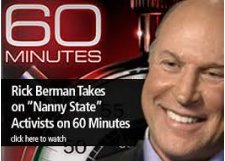 Last week I saw the newly released film, Merchants of Doubt. Robert Kenner, producer of Food Inc., once again brilliantly exposes the lie, the deception, and message manipulation that keeps normally intelligent people in the dark. The film explains how the lie often gets more light, more consideration, than the truth. I left the theater reminded of the danger in broadly giving others and their stories the benefit of the doubt. The film reveals the sociopaths among us. They operate from very dark places, knowing full well the damage they cause while taking pleasure in it.
Last week I saw the newly released film, Merchants of Doubt. Robert Kenner, producer of Food Inc., once again brilliantly exposes the lie, the deception, and message manipulation that keeps normally intelligent people in the dark. The film explains how the lie often gets more light, more consideration, than the truth. I left the theater reminded of the danger in broadly giving others and their stories the benefit of the doubt. The film reveals the sociopaths among us. They operate from very dark places, knowing full well the damage they cause while taking pleasure in it.
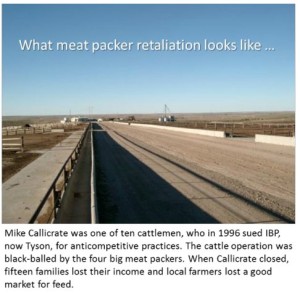 Around 40 years ago independent poultry farmers lost their markets. They either left the business or were led into contract grower serfdom by giant poultry companies and their partner banks, like the Farm Credit System. Sixteen years ago the big pork packers pounded pig prices down to 8 cents per pound, driving over 90% of our nation’s hog farmers out of business. A rigged milk market forced over 85% of our dairy farmers off their farms. Seventeen years ago my world suddenly and painfully changed. My fight to restore a fair market left me ostracized with no one who would buy my cattle. I had to shut down Callicrate Cattle Co., just one of over 39,000 cattle feeding operations that have been forced out of business.
Around 40 years ago independent poultry farmers lost their markets. They either left the business or were led into contract grower serfdom by giant poultry companies and their partner banks, like the Farm Credit System. Sixteen years ago the big pork packers pounded pig prices down to 8 cents per pound, driving over 90% of our nation’s hog farmers out of business. A rigged milk market forced over 85% of our dairy farmers off their farms. Seventeen years ago my world suddenly and painfully changed. My fight to restore a fair market left me ostracized with no one who would buy my cattle. I had to shut down Callicrate Cattle Co., just one of over 39,000 cattle feeding operations that have been forced out of business.
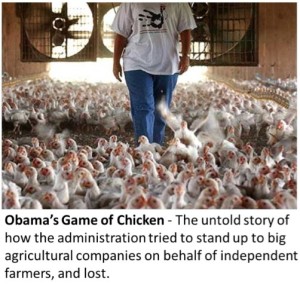 From the farm crisis of the eighties to the plundering and pillaging of the 1990s, to today’s final steps to totally crush any hope for an open and fair marketplace, the people who produce our food are left to suffer and die at the hands of big food companies. Not one Secretary of Agriculture in the last 100 years, including Secretary Vilsack in this current administration, have done their duty in protecting the marketplace. In fact, government policy has facilitated its demise. All the talk about rural development, support of young farmers, and USDA’s “Know your farmer, know your food” campaign, is nothing but a siren call to the corrupt fools game of corporate-controlled agriculture and its indentured servitude.
From the farm crisis of the eighties to the plundering and pillaging of the 1990s, to today’s final steps to totally crush any hope for an open and fair marketplace, the people who produce our food are left to suffer and die at the hands of big food companies. Not one Secretary of Agriculture in the last 100 years, including Secretary Vilsack in this current administration, have done their duty in protecting the marketplace. In fact, government policy has facilitated its demise. All the talk about rural development, support of young farmers, and USDA’s “Know your farmer, know your food” campaign, is nothing but a siren call to the corrupt fools game of corporate-controlled agriculture and its indentured servitude.
Individuals and groups like The Organization for Competitive Markets and R-CALF, warning that the loss of our markets is the loss our freedom have been laughed at and ridiculed by the meat industries’ own merchants of doubt. IBP’s CEO and President, Robert Peterson, arrogantly proclaimed the cause of crashing cattle prices during the 1980s and 90s: “It’s supply and it’s demand.” His toady defenders, from land grant university economists and commodity brokers to big cattle feeders hoping to gain IBP’s favor, cheered in agreement and shouted down those telling the truth. Meanwhile, IBP posted record profits as cattlemen went broke and consumers paid more. The many organizations that once represented independent producers, like the National Cattlemen’s Beef Association (NCBA) and the Kansas Livestock Association (KLA) were captured by the big meat packers. These organizations have provided cover for the meatpackers swindle as their members’ livelihoods were lost to the packers’ rigged marketplace.
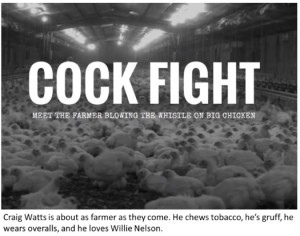 The meat industry’s merchants of doubt promoted many false messages like, “If you’re going broke, you must be a bad manager. You should learn to manage risk. You have to become more efficient. The beef industry can learn from the vertically integrated poultry industry. Change is inevitable.”
The meat industry’s merchants of doubt promoted many false messages like, “If you’re going broke, you must be a bad manager. You should learn to manage risk. You have to become more efficient. The beef industry can learn from the vertically integrated poultry industry. Change is inevitable.”
When we finally got the packers into a courtroom, they hired the most expensive masters of deception they could find. They claimed, “Correlation isn’t causation. Study after study has shown no effect from concentration and consolidation, and captive supplies don’t affect the market.” They falsely claimed “efficiency and economies of scale” in justifying their mergers and acquisitions.
Unbelievably, if you prove to a jury that you were cheated by a meatpacker, you still lose. The packers and their federal court judges came up with their “harm to competition” defense. So unless you could prove the impossible – that competition in the entire national market was negatively affected, you were denied compensation and justice. It was like a woman losing her purse to a thief having to prove that the theft of her purse damaged women with purses everywhere.
At the 2002 National Cattlemen’s Beef Association annual gathering, John Tyson, today a billionaire, promised cattlemen that if Tyson bought IBP, the world’s biggest beef packer, they would never vertically integrate like they did with the chicken and hog industries. Christopher Leonard in his 2014 book, The Meat Racket, details the abusive, destructive, inhumane and environmentally degrading system Tyson built in poultry, known as “Chickenization”.
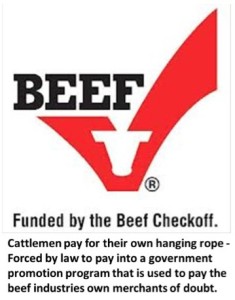 Like the tobacco industry’s answer to the anti-smoking campaign, or hired guns fighting the Mothers Against Drunk Driving, the beef industries main argument against the enforcement of antitrust laws was the same anti-government rhetoric: don’t tell us what to do, don’t interfere with our private business deals, no matter who gets hurt – freedom, freedom, freedom! NCBA leaders were guzzling the meatpackers Kool-Aid, along with their whiskey. With the help of NCBA, the meatpackers convinced Congress, the USDA, and court judges that they should be free to do anything they wanted as long as it was in their business interest. And to add insult to injury, the meatpackers did it with money and political power from the cattlemen’s own Beef Checkoff, originally established to promote beef, not fewer producers. The Beef Checkoff, captured by the meatpacker controlled NCBA via a merger in 1996, represents over 80% of their operating budget.
Like the tobacco industry’s answer to the anti-smoking campaign, or hired guns fighting the Mothers Against Drunk Driving, the beef industries main argument against the enforcement of antitrust laws was the same anti-government rhetoric: don’t tell us what to do, don’t interfere with our private business deals, no matter who gets hurt – freedom, freedom, freedom! NCBA leaders were guzzling the meatpackers Kool-Aid, along with their whiskey. With the help of NCBA, the meatpackers convinced Congress, the USDA, and court judges that they should be free to do anything they wanted as long as it was in their business interest. And to add insult to injury, the meatpackers did it with money and political power from the cattlemen’s own Beef Checkoff, originally established to promote beef, not fewer producers. The Beef Checkoff, captured by the meatpacker controlled NCBA via a merger in 1996, represents over 80% of their operating budget.
So Wendell Berry might ask someone who has been in a place for a long time, what’s missing, what’s changed?
- We’ve lost nearly half of our cattle ranchers.
- Over 39,000 cattle feeding operations have gone out of business, including small farmer feeders, good stewards, and husbandmen who fed their crops to their livestock, while spreading valuable manure on the land.
- Over 90 percent of our hog farmers are gone.
- Over 85 percent of our dairymen are out of business.
- At the same time that per capita poultry consumption has doubled (without a checkoff), per capita beef consumption has dropped by nearly a third (overall beef consumption is at record levels only due to population growth).
- We just weaned the smallest calf crop since 1941. Cattle prices are historically high, but a price should not be confused with a market.
- Retail beef prices are at all-time record highs.
- The poultry market is dead.
- The hog market is dead.
- And the finished cattle market is on life support.
- Four meatpackers slaughter 85% of the finished cattle compared to a third thirty years
ago. - A constitutional amendment was just approved by voters in Missouri allowing China to
buy more of the state for factory hog farms, and other uses, in accordance with China’s five-year food security plan. Senator Ken Schilz from Western Nebraska is sponsoring legislation to make the state of Nebraska and its precious land and water resources also available to China and other corporate and foreign interests. So-called Right to Farm laws are also pending in other states. - Essentially all of a farmer’s inputs and outputs are controlled by a handful of multinational corporations.
- Factory farms are growing in size and in numbers, not because they’re better in any way, but because they have market access through big food service and big retail, and they hold the power to externalize costs. Their industrial practices are wasteful, destroy soil health, pollute the environment, and the food they produce makes us sick.
- Big meat processors continue to destroy processing infrastructure by killing off smaller competitors, which forces producers to transport animals longer distances to slaughter. They continue to exploit their workers and fight against food safety oversight
- We are now dependent on other countries, multinational corporations, and foreign state-sponsored enterprises (China’s Smithfield and Brazil’s JBS) to feed ourselves.
- The U.S., once considered a model for feeding the world, is now a net food importer on a value basis.
Yes, the merchants of doubt in our food system are playing their game of deception very well. Folly marches on!
Thanks to filmmaker Robert Kenner for his important work and Wendell Berry for his words of wisdom.












